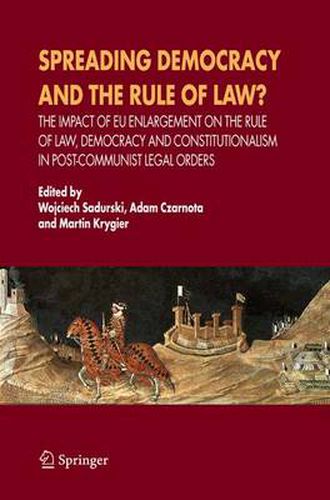Readings Newsletter
Become a Readings Member to make your shopping experience even easier.
Sign in or sign up for free!
You’re not far away from qualifying for FREE standard shipping within Australia
You’ve qualified for FREE standard shipping within Australia
The cart is loading…






This title is printed to order. This book may have been self-published. If so, we cannot guarantee the quality of the content. In the main most books will have gone through the editing process however some may not. We therefore suggest that you be aware of this before ordering this book. If in doubt check either the author or publisher’s details as we are unable to accept any returns unless they are faulty. Please contact us if you have any questions.
The accession of eight post-communist countries of Central and Eastern Europe (and also of Malta and Cyprus) to the European Union in 2004 has been heralded as perhaps the most important development in the history of European integration so far. While the impact of the enlargement on the constitutional structures and practices of the EU has already generated a rich scholarly literature, the influence of the accession on constitutionalism, democracy, human rights and the rule of law among the new member states has been largely ignored. This book fills this gap, and addresses the question of the consequences of the external force of European enlargement upon the understanding and practice of democracy and the rule of law and among both the main legal-political actors and the general public in the new member-states. A number of leading legal scholars, sociologists and political scientists, both from Central and Eastern Europe and from outside, address these issues in a systematic and critical way. Taken together, these essays help answer a fundamental question: does the European Union have the potential of promoting and consolidate democracy and human rights?
$9.00 standard shipping within Australia
FREE standard shipping within Australia for orders over $100.00
Express & International shipping calculated at checkout
This title is printed to order. This book may have been self-published. If so, we cannot guarantee the quality of the content. In the main most books will have gone through the editing process however some may not. We therefore suggest that you be aware of this before ordering this book. If in doubt check either the author or publisher’s details as we are unable to accept any returns unless they are faulty. Please contact us if you have any questions.
The accession of eight post-communist countries of Central and Eastern Europe (and also of Malta and Cyprus) to the European Union in 2004 has been heralded as perhaps the most important development in the history of European integration so far. While the impact of the enlargement on the constitutional structures and practices of the EU has already generated a rich scholarly literature, the influence of the accession on constitutionalism, democracy, human rights and the rule of law among the new member states has been largely ignored. This book fills this gap, and addresses the question of the consequences of the external force of European enlargement upon the understanding and practice of democracy and the rule of law and among both the main legal-political actors and the general public in the new member-states. A number of leading legal scholars, sociologists and political scientists, both from Central and Eastern Europe and from outside, address these issues in a systematic and critical way. Taken together, these essays help answer a fundamental question: does the European Union have the potential of promoting and consolidate democracy and human rights?